| |||||
| Centuries: | |||||
|---|---|---|---|---|---|
| Decades: | |||||
| See also: | Other events of 1560 List of years in Ireland | ||||
Events from the year 1560 in Ireland.
| |||||
| Centuries: | |||||
|---|---|---|---|---|---|
| Decades: | |||||
| See also: | Other events of 1560 List of years in Ireland | ||||
Events from the year 1560 in Ireland.
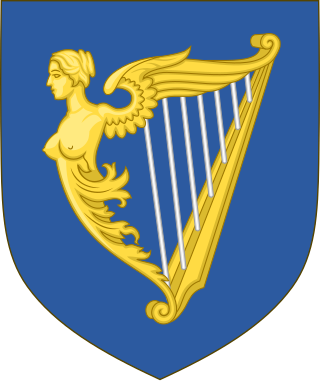
The Chief Secretary for Ireland was a key political office in the British administration in Ireland. Nominally subordinate to the Lord Lieutenant, and officially the "Chief Secretary to the Lord Lieutenant", from the early 19th century until the end of British rule he was effectively the government minister with responsibility for governing Ireland, roughly equivalent to the role of a Secretary of State, such as the similar role of Secretary of State for Scotland. Usually it was the Chief Secretary, rather than the Lord Lieutenant, who sat in the British Cabinet. The Chief Secretary was ex officio President of the Local Government Board for Ireland from its creation in 1872.

Lieutenant-Colonel Sir Matthew Nathan was a British soldier and colonial administrator, who variously served as the Governor of Sierra Leone, Gold Coast, Hong Kong, Natal and Queensland. He was Under-Secretary for Ireland from 1914 to 1916, and was responsible, with the Chief Secretary, Augustine Birrell, for the administration of Ireland in the years immediately preceding the Easter Rising.

The Kingdom of Desmond was a historic kingdom in southwestern Ireland. It was founded in 1118 by Tadhg Mac Cárthaigh, King of Munster when the Treaty of Glanmire formally divided the Kingdom of Munster into Desmond and Thomond. It comprised all of what is now County Cork and most of County Kerry. Desmond was ruled by the Mac Cárthaigh (MacCarthy) dynasty. Other clans within the kingdom included the O'Sullivans and O'Donovans. Following the Norman invasion of Ireland in the late 12th century, the eastern half of Desmond was conquered by the Anglo-Normans and became the Earldom of Desmond, ruled by the Fitzmaurices and FitzGeralds—the famous Irish family known as the Geraldines. The king of Desmond, Diarmaid Mac Cárthaigh submitted to Henry II of England, but the western half of Desmond lived on as a semi-independent Gaelic kingdom. It was often at war with the Anglo-Normans. Fínghin Mac Carthaigh's victory over the Anglo-Normans at the Battle of Callann (1261) helped preserve Desmond's independence. The kings of Desmond founded sites such as Blarney Castle, Ballycarbery Castle, Muckross Abbey and Kilcrea Friary. Following the Nine Years' War of the 1590s, Desmond became part of the Kingdom of Ireland.
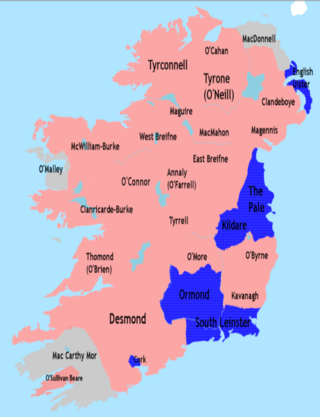
The Nine Years' War, sometimes called Tyrone's Rebellion, took place in Ireland from 1593 to 1603. It was fought between an Irish confederation—led mainly by Hugh O'Neill of Tyrone and Hugh Roe O'Donnell of Tyrconnell—against English rule in Ireland, and was a response to the ongoing Tudor conquest of Ireland. The war began in Ulster and northern Connacht, but eventually engulfed the entire island. The Irish alliance won numerous victories against the English forces in Ireland, such as the Battle of Clontibret (1595) and the Battle of the Yellow Ford (1598), but the English won a pivotal victory against the alliance and their Spanish allies in the siege of Kinsale (1601–02). The war ended with the Treaty of Mellifont (1603). Many of the defeated northern lords left Ireland to seek support for a new uprising in the Flight of the Earls (1607), never to return. This marked the end of Gaelic Ireland and led to the Plantation of Ulster.

The Eóganachta or Eoghanachta were an Irish dynasty centred on Cashel which dominated southern Ireland from the 6/7th to the 10th centuries, and following that, in a restricted form, the Kingdom of Desmond, and its offshoot Carbery, to the late 16th century. By tradition the dynasty was founded by Conall Corc but named after his ancestor Éogan, the firstborn son of the semi-mythological 3rd-century king Ailill Aulom. This dynastic clan-name, for it was never in any sense a 'surname,' should more accurately be restricted to those branches of the royal house which descended from Conall Corc, who established Cashel as his royal seat in the late 5th century.
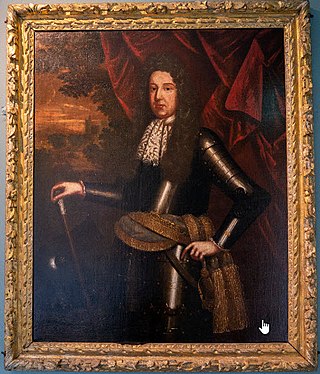
Sir Donough MacCarty, 1st Earl of Clancarty (1594–1665), was an Irish soldier, and politician. He succeeded his father as 2nd Viscount Muskerry in 1641. He rebelled against the government, demanding religious freedom as a Catholic and defending the rights of the Gaelic nobility in the Irish Catholic Confederation. Later, he supported the King against his Parliamentarian enemies during the Cromwellian conquest of Ireland.
During the Tudor conquest of Ireland (c.1540–1603), "surrender and regrant" was the legal mechanism by which Irish clans were to be converted from a power structure rooted in clan and kin loyalties, to a late-feudal system under the English legal system. The policy was an attempt to incorporate the clan chiefs into the English-controlled Kingdom of Ireland, and to guarantee their property under English common law, as distinct from the traditional Irish Brehon law system. This strategy was the primary non-violent method for Crown officials in the Dublin Castle administration to subjugate Irish clan leaders during the conquest. It was an unanticipated consequence to be required to pay fealty in currency instead of trade labor or commodities. The process of "surrender and regrant" thus created new, unfamiliar debt structures among the Irish, and these debts had social and political consequences.
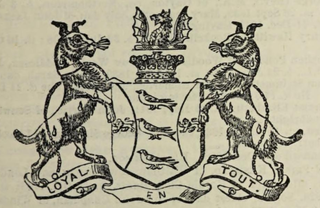
Sir Valentine Browne, of Croft, Lincolnshire, was auditor, treasurer and victualler of Berwick-upon-Tweed. He acquired large estates in Ireland during the Plantation of Munster, in particular the seignory of Molahiffe. He lived at Ross Castle near Killarney, County Kerry. He was MP in three English and one Irish parliaments.
Bardic poetry is the writings produced by a class of poets trained in the bardic schools of Ireland and the Gaelic parts of Scotland, as they existed down to about the middle of the 17th century or, in Scotland, the early 18th century. Most of the texts preserved are in Middle Irish or in early Modern Irish, however, even though the manuscripts were very plentiful, very few have been published. It is considered a period of great literary stability due to the formalised literary language that changed very little.
The Revd Dr Robert Brian MacCarthy is a clergyman in the Church of Ireland. He was Dean of Saint Patrick's Cathedral, Dublin from 1999 until his retirement in January 2012.

Justin Huntly McCarthy was an Irish writer, historian, and nationalist politician. He was a Member of Parliament (MP) from 1884 to 1892, taking his seat in the House of Commons of the United Kingdom.
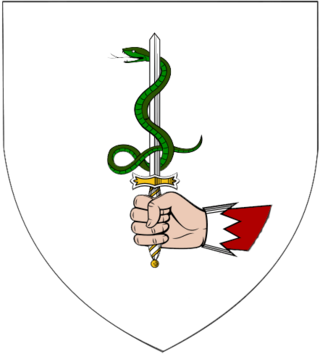
The O'Donovans are an Irish family. Their patronymic surname derives from Irish Ó Donnabháin, meaning the grandsons or descendants of Donnubán, referring to the 10th century ruler of the Uí Fidgenti, Donnubán mac Cathail. During the 12th and 13th century, O'Donovan relations relocated from the Bruree/Croom area south to the Kingdom of Desmond and to Carbery, where they were a ruling family for centuries and played a role in the establishment of a feudal society under the MacCarthys. Other septs retreated into the southeast corner of the Ui Fidgheinte territory, reaching from Broadford/Feenagh to the Doneraile area. The northern septs of the O'Donovans did not use a White Rod as the family's position in their original territory was vastly eroded, while several septs of O'Donovans in the southwest territories were semi-autonomous flatha under the MacCarthy Reagh dynasty in Carbery, with the most notable being local petty kings. The family were counted among the leading Gaelic nobility of Ireland.
Events from the year 1567 in Ireland.
Events from the year 1592 in Ireland.

The MacCarthy Reagh dynasty are a branch of the MacCarthy dynasty, Kings of Desmond, deriving from the Eóganacht Chaisil sept.

Justin McCarthy, 1st Viscount Mountcashel, PC (Ire), was a Jacobite general in the Williamite War in Ireland and a personal friend of James II. He commanded Irish Army troops during the conflict, enjoying initial success when he seized Bandon in County Cork in 1689. However, he was defeated and captured at the Battle of Newtownbutler later in the same year. He escaped and was accused of having broken parole. After the end of the war, he led an Irish Brigade overseas for service in the French Army. He died in French exile.
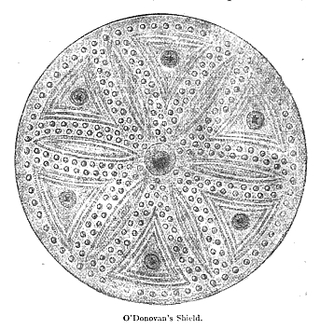
Donal II O'Donovan, The O'Donovan of Clann Cathail, Lord of Clancahill, was the son of Ellen O'Leary, daughter of O'Leary of Carrignacurra, and Donal of the Skins, The O'Donovan of Clann Cathail. He is most commonly referred to as Donnell O'Donevane of Castledonovan in contemporary references of his time.

Callaghan MacCarty, 3rd Earl of Clancarty was the second son of Donough MacCarty, 1st Earl of Clancarty. Callaghan was destined for a Catholic religious career and entered a seminary in France where his family was in exile during Cromwell's rule. When his elder brother died in the Battle of Lowestoft, and the 2nd Earl, his nephew, died in infancy, he unexpectedly left his religious institution, returned to Ireland, and assumed the title. He became a Protestant and married a Protestant wife. Late in life he converted back to Catholicism.
Helen Burke, Countess Clanricarde, also styled Helen FitzGerald, was brought to France by her mother fleeing the Cromwellian conquest of Ireland, against which her father, the 2nd Earl Muskerry, resisted to the bitter end. In France, she was educated at the abbey of Port-Royal-des-Champs together with her cousin Elizabeth Hamilton. She married three times. All her children were by her second husband, William Burke, 7th Earl of Clanricarde. She was the mother of Ulick Burke, 1st Viscount Galway, Margaret, Viscountess Iveagh, and Honora Sarsfield.
The chief governor was the senior official in the Dublin Castle administration, which maintained English and British rule in Ireland from the 1170s to 1922. The chief governor was the viceroy of the English monarch and presided over the Privy Council of Ireland. In some periods he was in effective charge of the administration, subject only to the monarch in England; in others he was a figurehead and power was wielded by others.